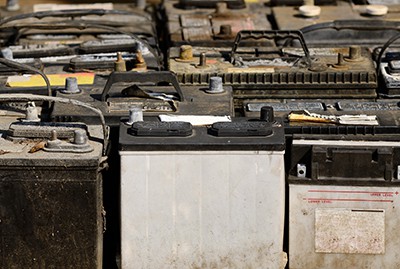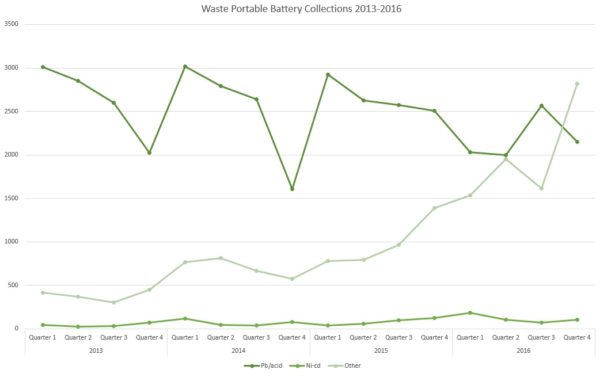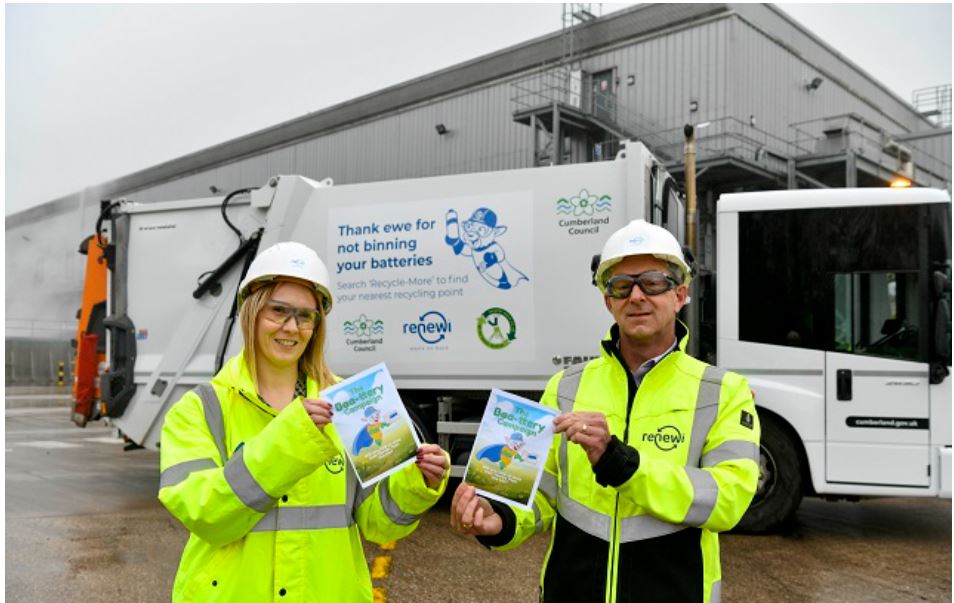The figures also indicate that much of the target has been met disproportionately through the collection of lead acid batteries, which has prompted a suggestion that the UK is ‘underperforming’ on battery recycling.
Provisional figures published by the Environment Agency, show that a total of 17,232 tonnes were collected for treatment by compliance schemes throughout 2016.
This means that the overall collection obligation of 17,289 tonnes – based on a target of 45% of the average annual amount of portable batteries placed onto the market by producers in 2014, 2015 and 2016 – has been missed by a small margin.
Of the tonnage collected, around 8,745 tonnes was comprised of lead acid batteries. This means that lead acid batteries accounted for 49% of the UK’s overall collection rate, despite making up only around 6% of the total tonnage placed onto the market during that time.
Lead acid
At the start of 2016 a change in the classification of portable batteries came into effect to address concerns that incorrect classification of lead acid batteries could be skewing data on the number of portable batteries collected for recycling. Recyclers had claimed that much of the overall target was being met by non-obligated batteries.
Portable batteries are the only category to which a recycling target has been attached – and battery recyclers had argued that as they are often unaware of the original use of some lead acid batteries, it is impossible to determine if they fall into the industrial or portable classification.
“Despite the change in guidance there has been no reduction in the proportion of portable lead acid battery evidence.”
Greg Clementson
G&P Batteries
As a result of this, the government had introduced a weight threshold on batteries from January 2016 – meaning that those weighing more than 4kg could no longer be classed as portable when placed onto the market by producers or received for recycling.
Following the change, battery compliance schemes had warned that greater effort would be needed to increase the capture of lighter portable batteries in order to meet the targets.
Commenting on the latest data, Greg Clementson, managing director of battery sorting firm G&P Batteries, said: “Despite the change in guidance there has been no reduction in the proportion of portable lead acid battery evidence, and I can see no rational explanation as to why this situation perpetuates, unless there is a massive under-reporting of material going on to the market or a similar over-reporting of material coming off the market, which implies that either battery manufacturers or the ABTOs [approved battery treatment operators] and the waste industry misunderstands this legislation.”
Mr Clementson claimed that the figures present a ‘false picture’ of the UK’s overall collection rate for batteries, adding: “That suggests that the UK is actually underperforming when it comes to the other battery chemistries.
“This situation is contrary to the aim and spirit of the legislation and cannot be sustainable in the long term. We really need an investigation into why lead acid batteries are dominating these collection rates and to look more closely into exactly how many batteries of other chemistries from the UK are being recycled.”
Collections
Concerns have also been raised over the overall performance, including the shortfall in collections. Mark Sayers, principal consultant at compliance scheme Ecosurety, has claimed that the shortfall has arisen due to small producers who are not obligated to fund the recycling of batteries, but contribute to material entering the market.

He said: “The Q4 figures show large producers through their compliance schemes have met their target for last year, which is good news. The shortfall has come from smaller producers who have effectively added to the target, but who are not compelled to actively recycle their batteries. Up to now the difference has been met by larger producers, but because the cost of recycling batteries has risen, larger producers through their schemes are recycling only enough to meet their obligation.
“This means they are no longer subsidising the small producers’ contribution. They are simply buying back their obligations. This shift shows the batteries market is tightening, and that costs are increasing. We would urge the EA to look again at this unintended consequence of the Regulations to see if there is a way forward. The system is definitely working, it now needs a bit of tweaking so that the spirit of the legislation comes through.”












Subscribe for free